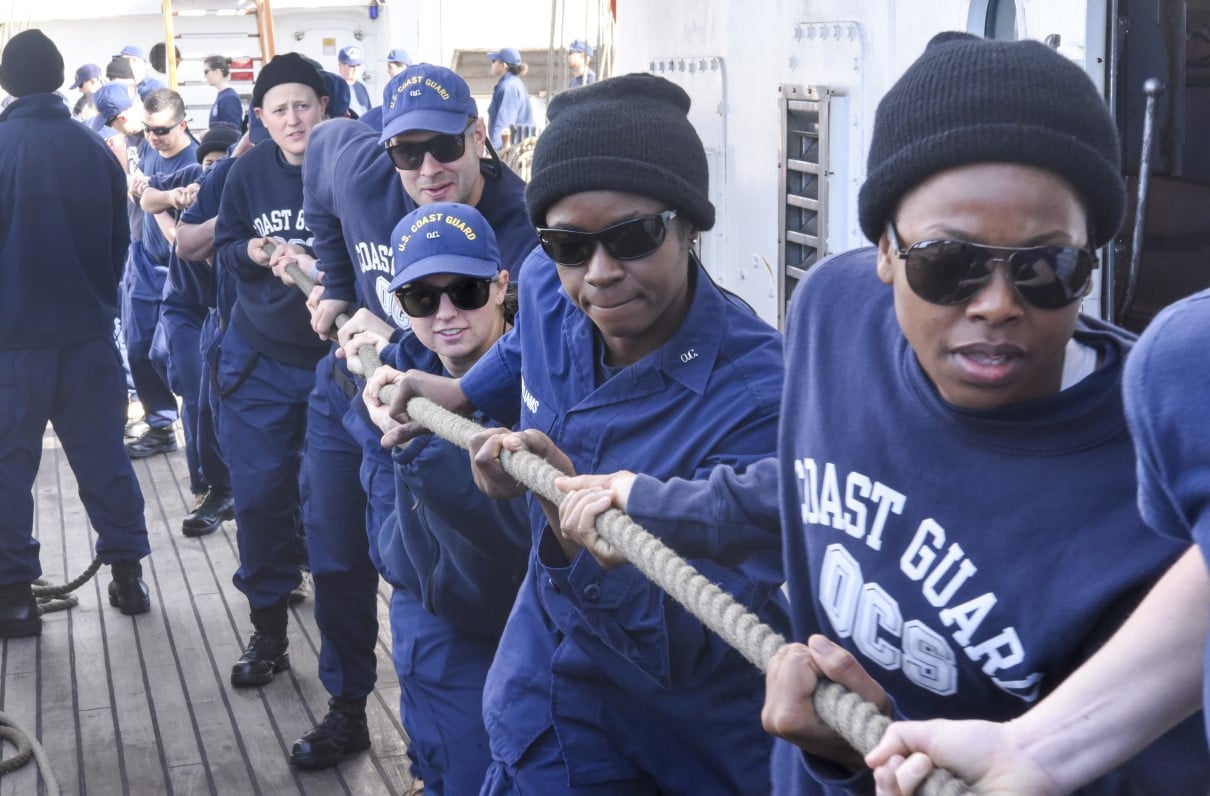The Coast Guard is ramping up efforts to recruit more women, people of color, and minorities to serve as officers, a move designed to better reflect the population of the country.
The service’s Officer Recruiting Corps is dedicated to reaching out to underrepresented talent pools. Bringing qualified people from these groups into leadership positions signals opportunities are open to everyone, leaders said.
“It reminds us that serving in the military and the Coast Guard, there is opportunity there to succeed,” said Cmdr. Andrea Smith, executive officer for Coast Guard Recruiting Command. She and Capt. Richter Tipton, commanding officer for the recruiting command, are responsible for standing up the new corps.
It will be the first time the Coast Guard has a dedicated officer recruiting corps, something already in place for the other armed services. It will alleviate some of the uncomfortable strain enlisted members may feel recruiting officers.
[RELATED: MOAA Board Member Reflects on the Power of Mentorship]
Lieutenants assigned to the corps will partner with historically Black colleges and universities (HBCUs) and other institutions with high minority populations. There are plans to invite interested candidates to Coast Guard air stations to offer a first-hand glimpse of Coast Guard jobs.
“They are producing the diverse, rich, talented population of individuals who have a plethora of options to go out into the world with,” Smith said. “We want them to see the Coast Guard as an employer that they would be interested in serving with and working for.”
Diversifying the Coast Guard has been a top priority for leadership. In a 2018 interview, Coast Guard Commandant Adm. Karl Schultz told Military Officer he wants the service to be more representative of the nation.
At that time, about 20% of the Coast Guard’s officers were women, yet women represented about 47% of the total workforce, according to the Bureau of Labor Statistics.
When Tipton pitched the idea for the corps to senior leaders, he said it would take about a year to establish. However, senior leaders like the idea so much they authorized five new positions for the recruiting command to stand up regional offices faster.
[RELATED: MOAA Life Member Served as Chief of the Army Nurse Corps]
“My goal here in increasing diversity of the Coast Guard is to get the right talent,” Tipton said. “It’s one of the big pushes that I’m having during my time here is to reinforce that concept. More ideas and more diversity make for better decisions, and better decisions lead to a better Coast Guard.”
The Coast Guard has celebrated minority members reaching new feats in recent years.
In 2010, Lt. Cmdr. La’Shanda Holmes was named the service’s first Black woman helicopter pilot. Since then, the “Fab Five” was formed when four other Black women joined her: Lt. Cmdr. Chanel Lee, Lt. Cmdr. Jeanine Menze, Lt. Cmdr. Ronaqua Russell, and Lt. Angel Hughes.
In 2019, Capt. Lexia Littlejohn became the first Black woman to command Coast Guard Sector Buffalo that protects the eastern Great Lakes. In 2016, Cmdr. Zeita Merchant became the first Black woman to serve as the commanding officer of a Marine Safety Unit.
“Uniquely, when the leadership is people of color, underrepresented minorities, women, all of those things just really speak to how you can be successful regardless of what your background is, what your gender is, what your demographic is or region of the country you come from,” Smith said.
She added seeing minority leaders can boost unit morale and inspire future generations of service.
“I think there’s this subconscious belief that if you don’t see yourself there then there’s this unknown hurdle,” Smith said. “What it says to the services, when we have officers of all backgrounds and colors and religions and sexual orientations doing all manner of things, it doesn’t just speak to other people like them that you can do anything, but it speaks to us holistically to say we should expect that from everyone.”
The Officer Recruiting Corps will be led by a commander at Coast Guard Headquarters in Washington, D.C., with four regional offices led by lieutenants for two-year assignments. The first offices will be established in New Orleans, Miami, Atlanta, and Hampton Roads, Va.
The first recruiters are expected to begin work in March, with the complete team in place by August.
MOAA Knows Why You Serve
We understand the needs and concerns of military families – and we’re here to help you meet life’s challenges along the way. Join MOAA now and get the support you need.

